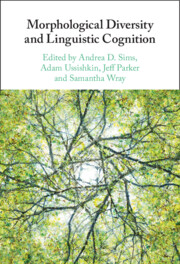Book contents
- Morphological Diversity and Linguistic Cognition
- Morphological Diversity and Linguistic Cognition
- Copyright page
- Contents
- Figures
- Tables
- Contributors
- Preface
- Abbreviations
- 1 At the Intersection of Cognitive Processes and Linguistic Diversity
- Part I In What Ways Is Language Processing Tuned to the Morphological Structure of a Language?
- 2 Tuning Language Processing Mechanisms to a Language’s Morphology without Decomposition: The Case of Semantic Transparency
- 3 Productivity Effects on Morphological Processing in Maltese Auditory Word Recognition
- 4 Phonotactic and Morphological Effects in the Acceptability of Pseudowords
- Part II What Role Does Cue Informativity Play in Learning and How the Lexicon Evolves Over Time?
- Part III How Do System-Level Principles of Morphological Organization Emerge?
- References
- Language Index
- General Index
3 - Productivity Effects on Morphological Processing in Maltese Auditory Word Recognition
from Part I - In What Ways Is Language Processing Tuned to the Morphological Structure of a Language?
Published online by Cambridge University Press: 19 May 2022
- Morphological Diversity and Linguistic Cognition
- Morphological Diversity and Linguistic Cognition
- Copyright page
- Contents
- Figures
- Tables
- Contributors
- Preface
- Abbreviations
- 1 At the Intersection of Cognitive Processes and Linguistic Diversity
- Part I In What Ways Is Language Processing Tuned to the Morphological Structure of a Language?
- 2 Tuning Language Processing Mechanisms to a Language’s Morphology without Decomposition: The Case of Semantic Transparency
- 3 Productivity Effects on Morphological Processing in Maltese Auditory Word Recognition
- 4 Phonotactic and Morphological Effects in the Acceptability of Pseudowords
- Part II What Role Does Cue Informativity Play in Learning and How the Lexicon Evolves Over Time?
- Part III How Do System-Level Principles of Morphological Organization Emerge?
- References
- Language Index
- General Index
Summary
Competing models of lexical access propose contrasting roles for morphological structure in word recognition. Whole-word models suggest that there are no separate representations for morphemes (e.g., Tyler et al. ); decomposition models posit that words are recognized by accessing their constituent morphemes (e.g., Taft et al. ); and hybrid models incorporate both pathways to recognition (e.g., Bertram et al. ). The relative productivity of a word’s derivational affixes may also play a role: words with unproductive affixes are processed holistically whereas words with productive derivational affixes are processed as a function of their morphemes (e.g., Balling and Baayen ). In this paper, we examine the role of the Semitic consonantal root, known to be a route for lexical retrieval, and its interaction with relative binyan productivity. Extending the methodology developed by Wray () for Jordanian Arabic, we investigate the Semitic language Maltese. Based on two auditory lexical decision experiments, we find a reverse base frequency effect in a productive binyan (words with more frequent roots are recognized more slowly than words with less frequent roots), and in two less productive binyanim we find no base frequency effect. This supports the validity of models in which morphological decomposition is relevant strictly for productive affixes.
Keywords
- Type
- Chapter
- Information
- Morphological Diversity and Linguistic Cognition , pp. 56 - 78Publisher: Cambridge University PressPrint publication year: 2022



